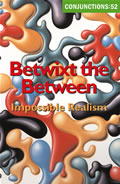
As a kid I lived in the closet of my mind. I spent most of my early life in there, trying on costumes. Later I'd go to college and read these textbooks where academics tried to shove the Universe into various corsets, but as a kid I wasn't reading for that kind of knowledge, that sort of adult girdle or belt. I just wanted to wear new skins, man. I wanted scales and wings. I'd figured out that you could do these really bizarre tricks in the library, right behind those hard burgundy chairs that smelled like paste and grandfathers, in full view of everybody — you could, for example, metamorphose. You could suture a character's wings to your own eight-year old body. You could drop Time like a skirt and step right outside its wrinkled orbit. You could live a lifetime in one hour on a rainy Wednesday, commune with the dead, you could duel and kill and die yourself without remorse in the Western Territories, run off with traveling carnivals, fall in and out of love, fall through a hole in your backyard into another galaxy (this was always happening in the YA books I liked; I think those kids needed better zoning laws).
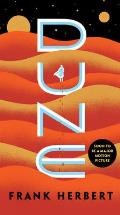 In the library I dutifully checked out these Bronte novels to throw the Teachers off my scent but inside my desk I had a stash of fairy tales and science fiction: Jack London, Ray Bradbury, Stephen King, Frank Herbert. The skins I got to wear in these books were thick hibernation whites, electronic carapaces, Martian plumage, whole-body carnival tattoos, the black straitjackets of nightmares (It, anybody? An evil clown named Pennywise uses balloons to lure kids to their deaths in the sewers — for six months I was afraid of all plumbing. I think it's a measure of a book's success if you've got two kid sisters seriously contemplating the use of a bed pan to avoid the killer clown in their bathroom). Rabbit fur in Watership Down. Those Arakis stillsuits in Dune. These skins were not restricting — they were great traveling clothes.
In the library I dutifully checked out these Bronte novels to throw the Teachers off my scent but inside my desk I had a stash of fairy tales and science fiction: Jack London, Ray Bradbury, Stephen King, Frank Herbert. The skins I got to wear in these books were thick hibernation whites, electronic carapaces, Martian plumage, whole-body carnival tattoos, the black straitjackets of nightmares (It, anybody? An evil clown named Pennywise uses balloons to lure kids to their deaths in the sewers — for six months I was afraid of all plumbing. I think it's a measure of a book's success if you've got two kid sisters seriously contemplating the use of a bed pan to avoid the killer clown in their bathroom). Rabbit fur in Watership Down. Those Arakis stillsuits in Dune. These skins were not restricting — they were great traveling clothes.
Last night I read this sentence from Micaela Morrissette's wonderful story in Conjunctions 52: Betwixt the Between and I felt that old, shivery pleasure that I used to get when reading as a kid at night, slipping out of my small body:
She knows what kind of skin it has — blue veined, with a thick translucence like shellfish, bruising easily in a kind of panic.
And, a little deeper in:
She knows that heartbeat will slow to the rhythm of its voice. She knows its eyes are colors from another spectrum...she's never seen it, but she knows.—Micaela Morrissette, "The Familiars"
As a reader, the hum of that alien gaze is my favorite experience. Like a truth that you recover through the act of reading; a shock of recognition, I guess, but not the easy kind. If you're afraid, there's a peppery recognition in there, too. I'm halfway into Conjunctions 52 (in which I also have a story, although I feel a little like the bedsheet ghost at a fantastic costume ball compared to some of these wild tales). I keep reading, and the Good, Scary Feeling keeps happening. The reverb of these stories in my body goes down deeper than thought. I don't even know what to compare it to — a psychic toothache? Some tingling at the roots.
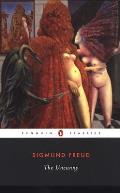 The other day I taught a class on The Uncanny by Sigmund Freud — whose name I pronounced so that it rhymed with "Frood." I think I may have been hungry. Poof! went all of the money in my Bank of Credibility. (This kind of thing has been happening all semester. I also asked them, when we were discussing Borges' "The House of Asterion," "Why does the Minotaur play with himself?" This turns out to be an unideal way to word the question. The story features an imaginary double — I meant to say, "Why does the Minotaur play these games with the Self?" — but suddenly all of the girl students were looking up in alarm, as if we were about to segue into a discussion of hairy monster penises.)
The other day I taught a class on The Uncanny by Sigmund Freud — whose name I pronounced so that it rhymed with "Frood." I think I may have been hungry. Poof! went all of the money in my Bank of Credibility. (This kind of thing has been happening all semester. I also asked them, when we were discussing Borges' "The House of Asterion," "Why does the Minotaur play with himself?" This turns out to be an unideal way to word the question. The story features an imaginary double — I meant to say, "Why does the Minotaur play these games with the Self?" — but suddenly all of the girl students were looking up in alarm, as if we were about to segue into a discussion of hairy monster penises.)
Anyhow, I was excited to find this line in Frood's Uncanny, which seemed to speak directly to the surprise and terror and joy of Speculative or Slipstream or New Fabulist fiction, whatever name you want to give to stories that reimagine the world:
The distinction between imagination and reality is effaced — something that we have hitherto regarded as imaginary appears before us in reality.
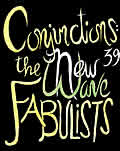 When Bradford Morrow contacted me about contributing to Conjunctions 52: Betwixt the Between with the subtitle "Impossible Realism," I was ecstatic; I felt like I'd just gotten asked out to Dark Prom. Brad tossed out a few names of potential contributors (Joyce Carol Oates, Ben Marcus, Stephen O'Connor, Elizabeth Hand, Jullia Elliot, among many awesome others), and I pictured all of us showing up with our midnight blue corsages to one weird ballroom. I was in college when Conjunctions 39: The New Wave Fabulists came out, and I still remember wandering around campus in a daze after reading Kelly Link's "Lull" in that issue, wrapping certain of her sentences around my head like the finest gauze. It was raining hard and I felt like a shark moving around the trees, just blindly motoring. People on South Campus kept asking me if I needed an umbrella but I couldn't let the "real" world back in yet. My pores were shut, I was in Kelly's world.
When Bradford Morrow contacted me about contributing to Conjunctions 52: Betwixt the Between with the subtitle "Impossible Realism," I was ecstatic; I felt like I'd just gotten asked out to Dark Prom. Brad tossed out a few names of potential contributors (Joyce Carol Oates, Ben Marcus, Stephen O'Connor, Elizabeth Hand, Jullia Elliot, among many awesome others), and I pictured all of us showing up with our midnight blue corsages to one weird ballroom. I was in college when Conjunctions 39: The New Wave Fabulists came out, and I still remember wandering around campus in a daze after reading Kelly Link's "Lull" in that issue, wrapping certain of her sentences around my head like the finest gauze. It was raining hard and I felt like a shark moving around the trees, just blindly motoring. People on South Campus kept asking me if I needed an umbrella but I couldn't let the "real" world back in yet. My pores were shut, I was in Kelly's world.
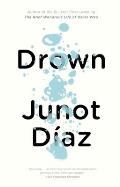 At that time I had been writing, for my fiction class, this truly godawful "Please God Let Me Be Junot Diaz P.S. I'm a 19 year old White Girl!" coming of age story about a Cuban American boy on a road trip; I think an abuela and the feral roosters of Key West were somehow involved. I had lots of puns, and at least one "feral cock" joke that compelled my professor to write a humongous red-pen "NO" in the margins. Roosters notwithstanding, this novella was a disaster. The world of the story was flat, fluorescent-lit. I was trying to write landscape and emotion as realistically as I could and yet what appeared on the page was the literary equivalent of dry Price Chopper spaghetti. I continue to love certain "realist" authors — folks like Alice Munro and Karen Shepard, who write stunningly imagined Possible Realism. But I got very nervous when I sat down to do this. When I wrote about that Cuban boy's emotional journey through a realistic America, I wanted to Get It Right, to transcribe with unimpeachable accuracy the nuances of our shared reality, and as a consequence I wrote like a grim stenographer (seltzer water, orange pantyhose), and in short the whole project would have been 10,000 times better if the rooster had been its protagonist.
At that time I had been writing, for my fiction class, this truly godawful "Please God Let Me Be Junot Diaz P.S. I'm a 19 year old White Girl!" coming of age story about a Cuban American boy on a road trip; I think an abuela and the feral roosters of Key West were somehow involved. I had lots of puns, and at least one "feral cock" joke that compelled my professor to write a humongous red-pen "NO" in the margins. Roosters notwithstanding, this novella was a disaster. The world of the story was flat, fluorescent-lit. I was trying to write landscape and emotion as realistically as I could and yet what appeared on the page was the literary equivalent of dry Price Chopper spaghetti. I continue to love certain "realist" authors — folks like Alice Munro and Karen Shepard, who write stunningly imagined Possible Realism. But I got very nervous when I sat down to do this. When I wrote about that Cuban boy's emotional journey through a realistic America, I wanted to Get It Right, to transcribe with unimpeachable accuracy the nuances of our shared reality, and as a consequence I wrote like a grim stenographer (seltzer water, orange pantyhose), and in short the whole project would have been 10,000 times better if the rooster had been its protagonist.
At night, in secret, I'd been writing these stories about starfish and lunatics and tooth artists and the moon. When I read Conjunctions and discovered that there were these other contemporary writers whose work demolished the boundaries between "genre" and "literary fiction," who wrote about devils and suburban marriages in the same paragraph, I felt this joy that is a little embarrassing to recollect. Oh, thank God, I remember thinking. These are my people. Or I wanted them to be, anyways. These authors were the single artificers of the universes they created, and in their fictions the most incredible things were occurring right alongside the banal and recognizable. I still get confused when people try to engage in these taxonomic debates about stories — realism vs. magical realism vs. science fiction vs. fabulism, etc. I never know how to species-identify specific stories. But I like to think of this stuff as High Stakes reading. Take a first sentence like this one from Scott Geiger's "A Design History of Icebergs and Their Applications," also in Conjunctions 52, Betwixt the Between:
Engineers of the Little Ice Age agonized over every move and countermove.
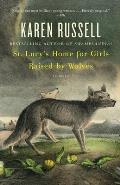 So right away you get the sense: Dorothy, you are not in Kansas, lady! Dorothy, girl, the storm is leaving, are you ready for liftoff? Welcome to the Little Ice Age. I love that move in stories. It's like, There's the ante! Who's in? Who's playing? Scott Geiger with his arms flung wide, asking us to make a Big Leap. When I'm trying to write a whacked-out story, I always feel like there's something especially intimate animating those first sentences — because you're beseeching the reader. You're saying, Reader, please jump and I'll catch you. I promise I'll catch you and hold you all the way through. I'm making a world for you. And as a reader, how seductive to get a sentence like this slam-bang opener from Julia Elliot's "Feral":
So right away you get the sense: Dorothy, you are not in Kansas, lady! Dorothy, girl, the storm is leaving, are you ready for liftoff? Welcome to the Little Ice Age. I love that move in stories. It's like, There's the ante! Who's in? Who's playing? Scott Geiger with his arms flung wide, asking us to make a Big Leap. When I'm trying to write a whacked-out story, I always feel like there's something especially intimate animating those first sentences — because you're beseeching the reader. You're saying, Reader, please jump and I'll catch you. I promise I'll catch you and hold you all the way through. I'm making a world for you. And as a reader, how seductive to get a sentence like this slam-bang opener from Julia Elliot's "Feral":
That autumn a pack of feral dogs swept into our schoolyard, barking and keening and charging the air with an electrifying stench — wild festering creatures, some bald with mange, others buried in comical clumps of matted frizz, or hobbling on three legs, or squinting through worm-eaten eyes.
So that a whole dangerous world opens before you, perfumed and ready for your entry.
And then there's this line from Ben Marcus' "Secret Breathing Techniques" that seems to be fashioned from the clay of some deeper preoccupation, a cave you can't reach with the spade of an "ordinary" sentence:
If I had thoughts, they occurred as hard noises in the foreground, a kind of thunder I walked into to discover instructions.
Sentences like the ones above hit me with this incredible force because they are moving and human but also they seem to be digging very close to the wordless place, the edge of sense. I got a similar jolt when I read Stephen O'Conner's line: "the head-cleansing scent of ants." That's some fierce cemetery music, isn't it? I geek out on this stuff. I love the Author-Reader labor of making a world together, and especially the challenge and peril of scaffolding these fictional architectures that by all rights should be impossible. When I was editing my story "Dowsing for Shadows" with Brad, we talked lot about how to unsteady the equilibrium of the story without tipping the reader into total bewilderment or a smoker's cynicism — how to lure the reader into a half-lit place, where she can dwell in possibilities. Who knows if it works that way, but I can tell you that it was straight fun to try to navigate that country, whatever name we've got in literature for that narrow road that runs between the graveyard and the sea. Quicklime. I think that all of the stories I've read so far in Conjunctions 52: Betwixt the Between offer unique maps of that soft place.
Phew! Well, obviously I am not a blogger — thanks for letting me babble on about the issue like this. I don't have any Big Wisdom to end on and if I keep writing I'll just start quoting Jurassic Park or something, so I thought I'd give the mic to Flannery.
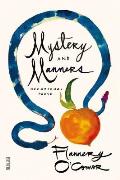 Flannery O'Connor, who I really adore, and who I think lived Betwixt the Between in a land of peacock feathers and blood-red Georgia sunsets and all that mallet-to-the-head Catholic grace — Flannery has this great quote from Mystery and Manners that I read all the time when I'm trying to work the right ratio of literal:fantastic:
Flannery O'Connor, who I really adore, and who I think lived Betwixt the Between in a land of peacock feathers and blood-red Georgia sunsets and all that mallet-to-the-head Catholic grace — Flannery has this great quote from Mystery and Manners that I read all the time when I'm trying to work the right ratio of literal:fantastic:
A good example of this is a story called "The Metamorphosis" by Franz Kafka. This is a story about a man who wakes up one morning to find that he has turned into a cockroach overnight, while not discarding his human nature. The rest of the story concerns his life and feelings and eventual death as an insect with human nature, and this situation is accepted by the reader because the concrete detail of the story is absolutely convincing. The fact is that this story describes the dual nature of man in such a realistic fashion that it is almost unbearable. The truth is not distorted here, but rather, a certain distortion is used to get at the truth.